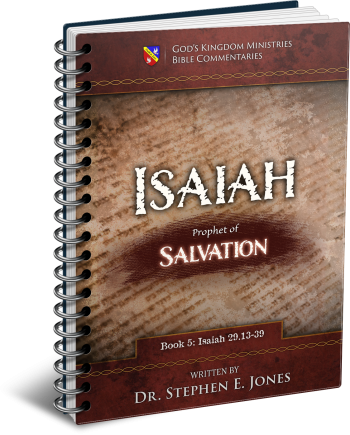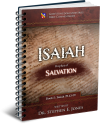Latest Posts
View the latest posts in an easy-to-read list format, with filtering options.

Isaiah is the prophet of Salvation. He is also known as the truly "Universalist" prophet, by which is meant that He makes it clear that salvation is extended equally to all nations and not just to Israel. He lived to see the fall of Israel and the deportation of the Israelites to Assyria, and he prophesied of their "return" to God (through repentance). He is truly a "major prophet" whose prophecies greatly influenced the Apostle Paul in the New Testament.
Category - Bible Commentaries

After admonishing the men of Judah to be “noble,” and after defining nobility in terms of loving one’s neighbor, Isaiah then addresses the women. Some commentators believe that the “women” and “daughters” are poetic references to the towns outside of Jerusalem, which were taken captive by the Assyrians before attempting to take Jerusalem itself.
Isaiah 32:9-11 says,
9 Rise up, you women who are at ease [sha’anon, “secure, tranquil, arrogant”], and hear my voice; give ear to my word you complacent [batakh, “confident, trusting (carelessly)”] daughters; for the vintage is ended, and the fruit gathering will not come. 10 Within a year and a few days [i.e., in a little more than a year] you will be troubled; O complacent daughters; for the vintage is ended, and the fruit gathering will not come. 11 Tremble, you women who are at ease; be troubled, you complacent daughters; strip, undress and put sackcloth on your waist.
Springtime was the time when kings went to war. In this case it appears that the Assyrian army devastated the land of Judah after the wheat harvest (May-June). The prophet focuses upon the destruction of the vintage, the grape harvest, which occurred in September. The Assyrian army was going to destroy the vineyards and prevent the people from receiving the new wine.
Isaiah 32:12-14 continues,
12 Beat your breasts for the pleasant fields, for the fruitful vine, 13 for the land of my people in which thorns and briars shall come up; yea, for all the joyful houses and for the jubilant city, 14 because the palace has been abandoned, the populated city forsaken. Hill and watch-tower have become caves forever, a delight for wild donkeys, a pasture for flocks;
The prophet appeals to the women to repent, seeing that the men (nobles) were not noble in the sight of God. Of course, the women of that day were mostly complacent as well, but the prophet appeals to them, showing the value and efficacy of their prayers, if they should take the word of the prophet seriously. Such destruction might be avoided if the women took the initiative and repented for the sins of their fathers and husbands.
We should note specifically the connection between the vintage of wine and the “joyful houses” and “jubilant city.” The grape harvest made possible the new wine offerings that were poured out each day on the feast of Tabernacles, or Booths. (See Num. 29:16, 19, 22, etc.) This feast in particular was a feast of rejoicing, for we read in Leviticus 23:39, 40,
39 On exactly the fifteenth day of the seventh month, when you have gathered in the crops of the land, you shall celebrate the feast of the Lord for seven days, with a rest on the first day and a rest on the eighth day. 40 Now on the first day you shall take for yourselves the foliage of beautiful trees, palm branches and boughs of leafy trees and willows of the brook, and you shall rejoice before the Lord your God for seven days.
Again, we read in Deuteronomy 16:13-15,
13 You shall celebrate the Feast of Booths to the Lord your God after you have gathered in from your threshing floor and your wine vat; 14 and you shall rejoice in your feast… 15 Seven days you shall celebrate a feast to the Lord your God in the place which the Lord chooses, because the Lord your God will bless you in all your produce and in all the work of your hands, so that you will be altogether joyful.
From a prophetic standpoint, the Feast of Tabernacles was the third and final feast where the people were to gather and set up booths around the place where God had chosen to put His name. Each of these feasts had a specific prophetic meaning that applied both individually and nationally.
In this case the prophet drew attention to the new wine that was supposed to be poured out during the seven days of Tabernacles. Hence, Isaiah 32:15 prophesies that after the destruction of the vineyards and the cancelation of the celebrations, there would be a long time of desolation…
15 Until the Spirit is poured out upon us from on high, and the wilderness becomes a fertile field, and the fertile field is considered as a forest.
That feast was to be cancelled the following year on account of the Assyrian invasion, but the prophet knew that the feast would be fulfilled in the end. We now live at the time of the end and will rejoice in seeing the fulfillment of this feast. The Passover Age ended at the cross; the Pentecostal age ended after 40 Jubilees; and we are now in the time of transition into the Tabernacles Age.
There is a glory seen in all of the feasts. When Jesus was about to go to the cross, He prayed in John 17:4, 5,
4 I glorified You on the earth, having accomplished the work which You have given Me to do. 5 Now, Father, glorify Me together with Yourself with the glory which I had with You before the world was.
Hence, as Jesus fulfilled the feast of Passover, He was glorified in His death and later in His resurrection. Seven weeks later, on the day of Pentecost, the church was glorified when the Spirit was poured out from on high in Acts 2:1-4. This was a secondary glory that was greater in the sense that the glory of Christ was shared with a larger body of people—the church. But the glory that Isaiah was seeing in Isaiah 32 was the glory of Tabernacles, which was to be even greater.
This glory of Tabernacles, Isaiah said, would turn the wilderness into a fruitful field and a lush forest. Such language speaks of the result of literal rainfall, but it prophesies of the outpouring of the Holy Spirit. The real purpose of this “former rain” is to make us fruitful and productive, as we saw from our study of Isaiah 30:23 and Joel 2:23.
Isaiah 32:16-18 describes this further, saying,
16 Then justice will dwell in the wilderness and righteousness will abide in the fertile field. 17 And the work of righteousness will be peace, and the service of righteousness quietness and confidence forever. 18 Then my [or “My”] people will live in a peaceful habitation, and in secure dwellings and in undisturbed resting places.
The outpouring of the Spirit will result in justice and righteousness. No one will be able to oppress his neighbor or steal from them with impunity. The righteous laws of God will replace the unjust laws of men, but more importantly, all will begin to have the law of God written in their hearts as they learn to be led by the Spirit.
Instead of the false complacency and overconfidence of those who think that they may live peaceably in a lawless lifestyle, the fulfillment of the Feast of Tabernacles will result in true peace, true quietness, and true confidence.
We may relate this to the great biblical principle of entering into God’s rest—the Jubilee rest—that is mentioned in Heb. 4:9, 10,
9 So there remains a Sabbath rest for the people of God. 10 For the one who has entered His rest has himself also rested from his works, as God did from His.
As we will see later when we study Isaiah 58:13, 14, God’s rest is to cease from one’s own works and one’s own words, doing as Jesus did as the great Amen (Rev. 3:14). An Amen person does only what he sees His heavenly Father do and speaks only what he hears his heavenly Father speak. This is the highest form of rest, God’s rest, and it is the ultimate purpose of the Sabbath law.
Isaiah 32:17 foretells the time when we will actually experience God’s rest fully and completely. It is the time of the prophetic vintage, when the Spirit is poured out as wine during the seven days of Tabernacles. This was not to be fulfilled in Isaiah’s time, for at that time the men and women of Judah remained unrepentant and the Assyrian army had been raised up to destroy the vineyards.
The words of the prophet are yet to be fulfilled. The “former rain” of Tabernacles is yet to be poured out from on high. I believe that we will see this soon, because we live at the end of the age and the beginning of a greater age to come. This outpouring of the Spirit “will convict the world concerning sin and righteousness” (John 16:8), not to condemn the world but to bring about repentance.
Isaiah 32:19, 20 concludes,
19 And it will hail when the forest comes down, and the city will be utterly laid low. 20 How blessed will you be, you who sow beside all waters, who let out freely the ox and the donkey.
Verse 19 speaks of the “forest” of trees as a metaphor of the Assyrian army. It will be cut down by the “hail” of truth that will sweep away the refuge of lies (Isaiah 28:17 and Rev. 16:21).
This prophesies of the end of the age when the captivity is reversed, when Mystery Babylon is exposed as “a prison of every unclean and hateful bird” (Rev. 18:2). This is “the city” that “will be utterly laid low.” John knew it as Mystery Babylon, saying, “So will Babylon, the great city, be thrown down with violence, and will not be found any longer” (Rev. 18:21).
Isaiah says that the blessed ones will “sow beside all waters,” and will “let out freely the ox and the donkey.” In other words, they will be fruitful and will work to set men free. They will walk in the light of the law of Jubilee and do as Jesus did.
Luke 4:18 says, “He has sent Me to proclaim release to the captives.” This was according to the law of Jubilee, at which time “each of you shall return to his own property, and each of you shall return to his family” (Lev. 25:10). That which was lost when Adam’s estate was sold, putting all of creation into bondage, “will be set free from its slavery to corruption into the freedom of the glory of the children of God” (Rom. 8:21).